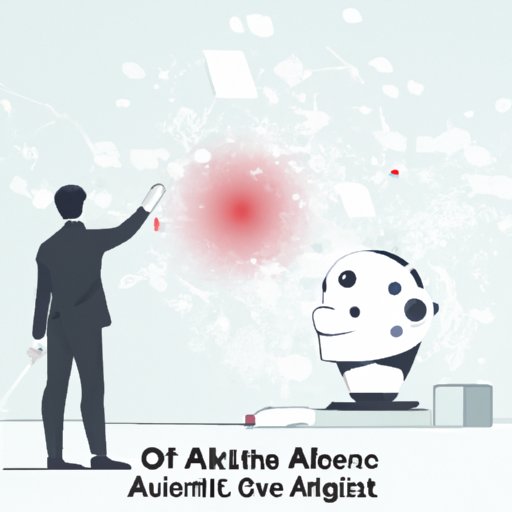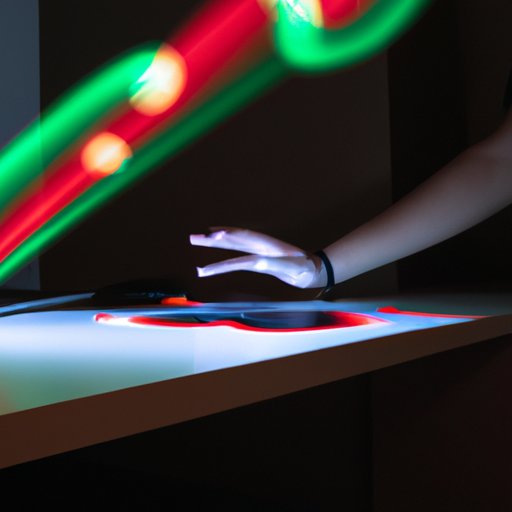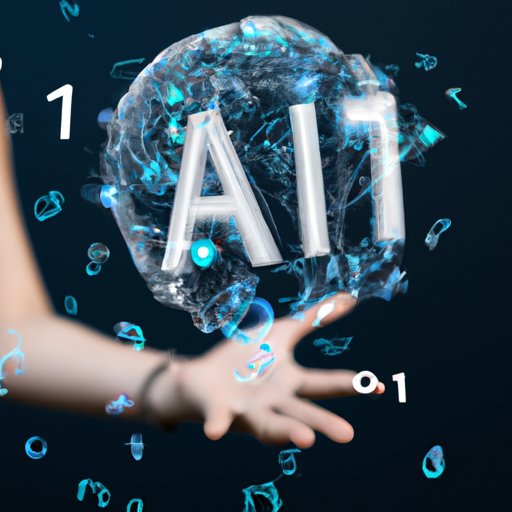Introduction
As technological advancements become more commonplace in everyday life, the question of whether artificial intelligence (AI) will eventually take over art has become increasingly relevant. AI is defined as a form of computer science that enables machines to learn from experience, adjust to new inputs, and perform human-like tasks. In recent years, AI has been used to create works of art and music that blur the line between what is considered truly “human” and what is created by a machine. This article will explore the potential of AI to enhance or replace human creative work, analyze the ethical implications of AI art, and investigate the intersection of technology and creativity.

Examining the Potential of AI to Enhance or Replace Human Creative Work
AI-generated art has come a long way since the first computer-generated drawings were produced in the 1950s. Today, AI algorithms are able to generate paintings and sculptures that rival those of human artists. AI art can be generated through two main methods: generative adversarial networks (GANs) and deep learning. GANs involve two neural networks—a generator network and a discriminator network—working together to create realistic images. Deep learning involves training an AI algorithm on a large dataset of images, so it can learn to recognize patterns and generate its own unique images.
AI-generated art has both advantages and disadvantages when compared to traditional art. On the plus side, AI-generated art can be generated quickly and cheaply, and can produce a virtually unlimited number of unique images. AI also allows for greater experimentation with color, texture, and composition, which can lead to innovative and unexpected results. On the downside, AI-generated art lacks the originality and emotional depth of art created by humans. As AI algorithms become more sophisticated, however, this could change.
Analyzing the Ethical Implications of AI Art
The ethical implications of AI art are complex and far-reaching. From a moral standpoint, there is a question of whether AI art should be considered a legitimate form of artistic expression. Additionally, there are legal considerations surrounding the ownership of AI-generated artwork. Should the artist who created the AI algorithm be considered the author of the work, or should the machine that created the artwork be credited as the author?
Another ethical concern is the role of human creativity in AI art. While AI algorithms can generate unique and interesting images, they cannot replicate the emotional depth of human-created artwork. This raises the question of whether AI-generated art should be considered a true form of artistic expression. Some experts argue that AI art is merely a tool for human creativity, while others argue that AI algorithms can be seen as autonomous entities capable of creating their own works of art.

Investigating the Intersection of Technology and Creativity
As AI technology advances, the potential applications for AI art are growing. AI algorithms are being used to create movies, music, and even fashion designs. Additionally, AI is being used to enhance existing artwork by providing feedback and suggestions to human artists. For example, some AI algorithms can provide feedback on composition and color choices, allowing human artists to refine their work more quickly and efficiently.
Despite the potential benefits of AI art, there are still many challenges to be addressed. AI algorithms are only as good as the data they are trained on, so any biases or errors in the data can be reflected in the artwork. Additionally, AI algorithms can be costly to develop and maintain, making them out of reach for many aspiring artists. Finally, the ethical implications of AI art must be considered, as well as the question of whether AI art can ever truly replicate the emotional depth of human-created artwork.
Conclusion
AI technology is rapidly changing the landscape of artistic expression. AI algorithms are being used to generate artwork, provide feedback to human artists, and even create entire movies. While AI art has the potential to enhance existing artwork, there are still many ethical and practical considerations to be addressed. The future of AI and artistic expression remains to be seen, but it is clear that the intersection of technology and creativity will continue to evolve in exciting and unpredictable ways.
Summary of Findings
This article explored the potential of AI to enhance or replace human creative work, analyzed the ethical implications of AI art, and investigated the intersection of technology and creativity. AI art has both advantages and disadvantages compared to traditional art, and raises ethical questions regarding the ownership and authorship of AI-generated artwork. Additionally, AI algorithms are being used to provide feedback and suggestions to human artists, although the cost and complexity of developing and maintaining AI algorithms remain a challenge. Ultimately, the future of AI and artistic expression remains to be seen, but it is clear that the intersection of technology and creativity will continue to evolve.
Recommendations for Further Investigation
Further research is needed to explore the potential applications of AI art, as well as the ethical implications of using AI algorithms to generate artwork. Additionally, more research is needed to determine the best practices for developing and maintaining AI algorithms, and to identify ways to make AI technology more accessible to aspiring artists. Finally, more research is needed to understand the role of human creativity in AI art, and to determine whether AI-generated art can ever truly replicate the emotional depth of human-created artwork.
(Note: Is this article not meeting your expectations? Do you have knowledge or insights to share? Unlock new opportunities and expand your reach by joining our authors team. Click Registration to join us and share your expertise with our readers.)
